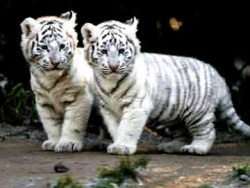Difference between revisions of "White Tiger"
| Line 22: | Line 22: | ||
As we have seen, white [[jade]] was used when the [[Tiger]] [[god]] of the [[West]] was [[worshipped]]; it is known as '[[tiger]] [[jade]];' a [[tiger]] was depicted on the [[jade]] [[symbol]]. | As we have seen, white [[jade]] was used when the [[Tiger]] [[god]] of the [[West]] was [[worshipped]]; it is known as '[[tiger]] [[jade]];' a [[tiger]] was depicted on the [[jade]] [[symbol]]. | ||
| − | To the {{Wiki|Chinese}} the [[tiger]] was the [[king]] of all [[animals]] and lord of the [[mountains]], and the tiger-jade ornament was specially reserved for commanders of armies. | + | To the {{Wiki|Chinese}} the [[tiger]] was the [[king]] of all [[animals]] and lord of the [[mountains]], and the [[tiger]]-jade ornament was specially reserved for commanders of armies. |
The {{Wiki|male}} [[tiger]] was, among other things, the [[god of war]], and in this capacity it not only assisted the armies of the [[emperors]], but fought the {{Wiki|demons}} that threatened the [[dead]] in their graves." | The {{Wiki|male}} [[tiger]] was, among other things, the [[god of war]], and in this capacity it not only assisted the armies of the [[emperors]], but fought the {{Wiki|demons}} that threatened the [[dead]] in their graves." | ||
| − | The Tiger’s seven seishuku 星宿 ([[constellations]]) are: | + | The [[Tiger’s seven seishuku]] [[星宿]] ([[constellations]]) are: |
<poem> | <poem> | ||
Latest revision as of 16:18, 24 November 2015
White Tiger represents the earth, the West and so, the afterlife.
The white tiger is a pigmentation variant of the Bengal tiger, which is reported in the wild from time to time in the Indian states of Assam, Bengal, Bihar, Sunderbans and especially in the former State of Rewa.
West - The White Tiger
Guards Buddha’s teachings and mankind; observes world with clairvoyance; corresponds to the season fall, the color white, wind, the element metal, and the virtue righteousness.
Says Donald Mackenzie: "The White Tiger of the West, for instance, is associated with metal. When, therefore, metal is placed in a grave, a ceremonial connection with the tiger god is effected.
According to the Chinese Annals of Wu and Yueh, three days after the burial of the king, the essence of the element metal assumed the shape of a white tiger and crouched down on the top of the grave. Here the tiger is a protector - a preserver.
As we have seen, white jade was used when the Tiger god of the West was worshipped; it is known as 'tiger jade;' a tiger was depicted on the jade symbol.
To the Chinese the tiger was the king of all animals and lord of the mountains, and the tiger-jade ornament was specially reserved for commanders of armies.
The male tiger was, among other things, the god of war, and in this capacity it not only assisted the armies of the emperors, but fought the demons that threatened the dead in their graves."
The Tiger’s seven seishuku 星宿 (constellations) are:
Tokaki Boshi (Chn. = K’uei 奎)
Tatara Boshi (Chn. = Lou 婁)
Ekie Boshi (Chn. = Wei 胃)
Subaru Boshi (Chn. = Mao 昴)
Amefuri Boshi (Chn. = Pi 畢)
Toroki Boshi (Chn. = Tsui 觜)
Kagasuki Boshi (Chn. = Shen 參)
